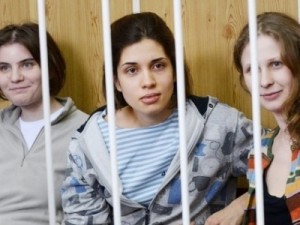Pussy Riot sentenced in prison to two years
On Friday, after something of a show trial, three young women in a Russian punk band were found guilty and sentenced to two years in prison for an anti-Vladimir Putin protest in a Moscow cathedral earlier this year.
But, despite its high profile, the Pussy Riot trial was just one on a long list of crackdowns on freedom of expression that human rights activists and observers have compiled since Putin returned to the Russian presidency in May.
Pussy Riot, an all-female band, had performed their song, Madonna, Drive Putin Away at a Russian Orthodox cathedral on February 21. The performance was uploaded to YouTube.
On the eve of the March 4 presidential vote, the first arrests took place and on March 15 they were charged with hooliganism.
Even before the trial began, the case was proceeding with dubious legality. “The case is full of procedural violations and they are trying to speed up the hearing to ensure that we don’t have time to respond to them all” – a lawyer for one of the accused said July 4.
The United States called the sentences “disproportionate”, while Britain, France and the European Union also said the punishment was excessive and questioned Russia’s rights record. Prominent supporters of the women spoke out to criticise the sentence.
International pressure “may not have secured the outcome many people wanted to see. But we need to keep up the fight” – wrote British member of parliament Kerry McCarthy, who attended the trial, on blog site LabourList. Newspaper owner Alexander Lebedev, who co-owns Russia’s Novaya Gazeta daily and owns Britain’s Independent daily, called the women “prisoners of conscience” on Twitter.
Yoko Ono, the avant-garde artist and widow of John Lennon, posted a message of support to Samutsevich on Twitter on Saturday, saying – “You have won for all of us women in the world.” Russian media and politicians raised the possibility of the women’s sentence being reduced.
“There is a feeling that the Moscow city court, after the lawyers’ appeal, will cut (the sentence) down to only one year” – Komsomolskaya Pravda daily said Saturday. “On appeal they will minimise the defendants’ sentence so much that they will come out a month after the court” – predicted lawyer and member of the Public Chamber advisory body, Denis Dvornikov, cited by the Interfax news agency.
Madonna (who had already voiced her support for the Russian punk band Pussy Riot) on Saturday joined a chorus of celebrities in slamming a jail sentence handed down in Moscow to three women from the group over a protest against President Vladimir Putin.
“I protest the conviction and sentencing of Pussy Riot to a penal colony for two years for a 40-second performance extolling their political opinions” – Madonna said in a statement.
The three women, Nadezhda Tolokonnikova (22) Maria Alyokhina (24) and Yekaterina Samutsevich (30) were convicted in a Russian court of hooliganism motivated by religious hatred for performing a “punk prayer” in Moscow’s Christ the Saviour Cathedral in which they called on the Virgin Mary to rid Russia of Putin.
The two-year sentence handed down against the three women on Friday has generated outrage outside of Russia, but within the country polls have shown that few Russians sympathize with them.
Judge Marina Syrova told the Moscow court on Friday: “The girls’ actions were sacrilegious, blasphemous and broke the church’s rules.” She rejected their argument that they had no intention of offending Russian Orthodox believers.
Madonna had previously expressed her support for the band after they were arrested.
In her latest statement, Madonna said the two-year sentence was “too harsh and in fact is inhumane.”
“They’ve spent enough time in jail. I call on all of Russia to let Pussy Riot go free” – she said.
